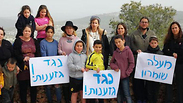The situation is not improving, not in Israel and not in the rest of the world. The International Day for the Elimination of Racial Discrimination on March 21 is meant to warn us, and the very need for such a day, requires every effort to defeat our evil instincts.
Many of us here in Israel exhibit signs of prejudiced behavior while swearing to not have “a racist bone in our bodies.” We discriminate against Ethiopian Jews because of their skin color, against Arabs because of their nationality and religion, against the ultra-Orthodox because of their weird clothing and against immigrants from the former Soviet Union because of their accent.
The French philosopher and Holocaust survivor, Emmanuel Levinas, dedicated much of his work to making people understand the concept of “the other.” Israelis would not have become his best students.
In a Jewish and democratic state we are supposed to, perhaps more than any other nation, to distance ourselves from racism as far away as possible. Because the Holocaust is the ultimate manifestation of prejudice in its most extreme form. Rabbi Akiva, hundreds of years ago, talked about the need to treat each other with fairness. This message, however, has not been internalized, since we see people who clearly hold prejudiced and racist views enter the Knesset.
The Palmur Commission report, initiated by the Director General of the Ministry of Justice, was submitted to the government three years ago and found that racist and prejudiced attitudes—especially toward Ethiopian Jews—are rampant among the government employees in various ministries. As part of the recommendations that were adopted by the government, a special unit was established—meant to coordinate the fight against racism within the Israeli officialdom—as well as a public advisory committee, which was headed by me. The unit, which has been operating for the past two years, works to eliminate racism and prejudice in government institutions.
The legal and ethical foundation of the unit is based around the principle of equality, which in turn is an integral part of the principles of the Declaration of Independence, and is anchored in court rulings. In addition, I believe that it should be enshrined in Basic Law, which, despite the opinions of some, will not harm Israel's identity as a Jewish and democratic state.
The unit has already received hundreds of complaints. Racism and prejudice, unfortunately, exist within the establishment, and it shouldn’t be discounted as just another expression of populism. As far as the Ethiopian Jews are concerned, one can only wonder why some have clung to the Chief Rabbinate’s decisions in the 1980s that required immigrants from Ethiopia to go through a ritual conversion ceremony, while ignoring the ruling of the late Rabbi Ovadia Yosef, who recognized the community as Jewish according to halacha.
The principle of equality is not too hard to grasp. We should all treat each other the way we want to be treated. There is no room for racism or prejudice, certainly not in the public sector and certainly not in the Knesset.
Anti-Semitism is the oldest form of racism. Since we just celebrated Purim, let’s remember that the Book of Esther begins with an episode describing prejudice and racial hatred. Anti-Semitism, as inexplicable as it is, refuses to die, and only takes different shapes every other generation. Some of us believed after the Holocaust people would be ashamed to be anti-Semitic, but unfortunately we had been proven wrong. In Britain, for instance, anti-Semitic discourse in the Labor Party is a cause for great concern.
When we first started to take notice of this phenomenon growing in the governmental sphere some 30 years ago—when I served as the Government Secretary—one of the senior ministers said to me: "Governments must deal with problems of the present and the future, anti-Semitism is in the past.” You could say he was overly optimistic, may he rest in peace.
In order for us to lawfully combat anti-Semitism, and the Boycott, Divestment and Sanctions movement—across diplomatic, educational, and legal sectors—we must eliminate prejudice within our society in order not to supply our enemies with anything they could weaponize against us. Just some food for thought.


















